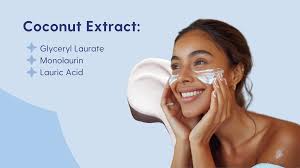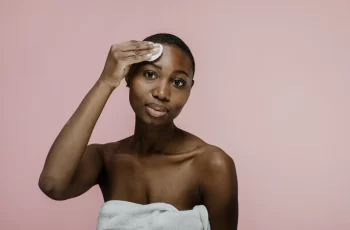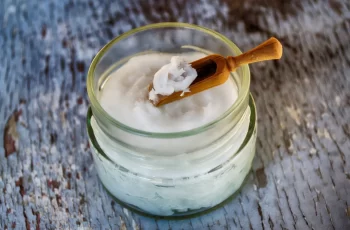
Glyceryl Laurate, Monolaurin, and Lauric Acid: Coconut-derived Ingredients in Skin Care
Coconut extracts are not the same thing as coconut oil. Glyceryl laurate, monolaurin and lauric acid, are derived from coconut oil, but have very different properties than coconut oil. The biggest difference is, these coconut extracts are not comedogenic but coconut oil is.
These coconut extracts have gained popularity in skincare products due to their impressive anti-inflammatory, antibacterial, and moisturizing properties. These natural compounds are particularly effective in treating acne, inflammation, and sensitive skin. This blog will discuss why these coconut oil derivatives are found in acne skin care products even though coconut oil itself is comedogenic.
To find the best products for your skin type, take the quiz for free today! Also As a thank you for reading our educational content, use the code STSblog20 at checkout for 20% off your order!
Glyceryl laurate, monolaurin and lauric acid are non-comedogenic
Safe for use during pregnancy and breastfeeding
Anti-microbial against C. acnes, S. aureus, fungi, yeast, and Malassezia species
Reduce inflammation by inhibiting pro-inflammatory pathways
Coconut Extract in Skin Care
These are several types of coconut extracts used in skin care. The most common ones, and the ones that have the most evidence based research are glyceryl laurate, monolaurin, and lauric acid. If you’re just looking for a list of my favorite products with coconut in general, here they are:
Glyceryl Laurate
Glyceryl Laurate is a monoester formed from the combination of glycerin and lauric acid. It is a versatile ingredient commonly found in skincare products due to its emollient, emulsifying, and antimicrobial properties. Both glyceryl laurate and lauric acid are derived from coconut oil, showcasing their natural origin and sharing many beneficial properties for skincare.
Lauric Acid
Lauric Acid is a medium-chain saturated fatty acid. It is extracted from coconut oil. It exhibits strong antimicrobial activity, particularly against bacteria and fungi, and is valued in skincare for its ability to penetrate the skin and provide deep hydration while offering protection against microbial invaders. Lauric acid is non-comedogenic, making it suitable for acne-prone and sensitive skin types.
Monolaurin
Monolaurin is a glycerol ester of lauric acid. It is a gentle compound known for its anti-inflammatory and antibacterial properties, effective in soothing the skin and preventing irritation and itching that can occur when microbes enter cracks in very dry skin. Monolaurin is often used in formulations aimed at maintaining skin health and preventing microbial infections without causing further irritation.
Types of Products
Glyceryl laurate, monolaurin, and lauric acid are highly versatile and can be found in a wide range of skincare products, from cleansers to moisturizers.
One of the notable brands that features glyceryl laurate prominently is VMV Hypoallergenics, which specializes in products for sensitive skin. This brand uses glyceryl laurate as a foundational ingredient in its allergen-free products.
Cleansers with Coconut Extract
In cleansers, glyceryl laurate, monolaurin and lauric acid help to remove impurities from the skin without stripping away essential lipids. This is particularly important for individuals with dry or sensitive skin, as harsh cleansing can exacerbate skin issues.
Moisturizers with Coconut Extract
In moisturizers, these coconut derived ingredients provide hydration and help to repair the skin barrier. Glyceryl laurate, monolaurin, and lauric acid work by replenishing the skin’s natural moisture levels and forming a protective layer that prevents water loss. This dual action not only keeps the skin hydrated but also protects the skin, making it more resilient against environmental stressors, pollution, and potential irritants.
Benefits
The benefits of glyceryl laurate, monolaurin and lauric acid in skincare are extensive, particularly for those dealing with acne, sensitive skin, or inflammatory conditions. These compounds offer a range of advantages that make them valuable additions to skincare formulations.
Anti-Inflammatory and Soothing
Inflammation is a common underlying cause of many skin conditions, including acne, eczema, and rosacea. Monolaurin and lauric acid help to reduce inflammation by inhibiting the production of pro-inflammatory compounds such as cytokines. Specifically, these compounds have been found to suppress the expression of interleukin-6 (IL-6), interleukin-8 (IL-8), and tumor necrosis factor-alpha (TNF-α), which are critical mediators in the inflammatory response. By blocking these pathways, monolaurin and lauric acid help to reduce the production of reactive oxygen species (ROS) and other inflammatory mediators, which in turn soothes irritated skin, reduces redness, and prevents the exacerbation of skin conditions.
Antimicrobial
Both monolaurin and lauric acid have been shown to be effective against Cutibacterium acnes, the bacteria responsible for acne. Their antibacterial action helps to reduce the presence of this acne-causing bacteria on the skin, thereby minimizing the risk of breakouts. Additionally, these compounds are effective against other harmful microbes, which can contribute to various skin infections. It also reduces levels of Staph aureous bacteria.
Hydrating and Moisturizing
These compounds are excellent moisturizers that help to maintain the skin’s hydration levels. By forming a protective layer on the skin, they prevent water loss and keep the skin soft and supple. This moisturizing effect is crucial for individuals with dry or sensitive skin, as it helps to prevent cracking and irritation.
Non-comedogenic Nature
One of the significant advantages of monolaurin and lauric acid is that they are non-comedogenic in their purified forms. This means they do not clog pores, making them suitable for acne-prone skin. While coconut oil itself can be comedogenic, the extraction process for monolaurin and lauric acid ensures that these compounds retain their beneficial properties without causing pore blockages.
Safety
Monolaurin and lauric acid, being naturally derived from coconut oil, are generally considered safe and clean ingredients in skincare formulations. They are widely used due to their minimal risk of causing allergic reactions. Most individuals tolerate these ingredients well, even those with sensitive skin.
The EWG rates glyceryl laurate EWG as safe (1-3) There is no EWG safety rating for monolaurin or lauric acid.
Their safety profile is supported by their non-toxic nature and the lack of adverse effects reported in the literature. They are free from harmful chemicals, making them safe for women who are pregnant or breastfeeding and looking for clean, naturally-derived skincare options.
Skin Conditions
Monolaurin and lauric acid are effective in treating a variety of skin conditions due to their antimicrobial and soothing properties. These compounds are valuable in managing conditions such as acne, rosacea, eczema, and yeast infections on the skin.
Acne
Acne is primarily caused by the proliferation of Cutibacterium acnes bacteria on the skin. Monolaurin and lauric acid help to reduce the presence of these bacteria, thereby preventing acne breakouts. Additionally, their anti-inflammatory properties help to reduce the redness and swelling associated with acne, leading to clearer and calmer skin. These compounds are also effective against Staphylococcus aureus, another bacteria that can contribute to skin infections and acne.
Rosacea
Rosacea is a chronic inflammatory condition characterized by redness, flushing, and sometimes acne-like breakouts. Monolaurin and lauric acid may help manage rosacea by reducing inflammation and potentially acting against Demodex mites, which are associated with the condition. These mites can exacerbate rosacea symptoms, and the antimicrobial properties of these compounds help to control their population on the skin.
Eczema
Eczema, or atopic dermatitis, is a condition characterized by dry, itchy, and inflamed skin. The compromised skin barrier in eczema makes it susceptible to infections. Monolaurin and lauric acid help to prevent skin infections by reducing the bacterial load on the skin. Their moisturizing properties also help to repair the skin barrier, providing relief from dryness and irritation. By decreasing skin bacterial counts, these compounds help to prevent secondary infections in eczema-prone skin.
Yeast Infections
Yeast infections can occur in various areas of the body, including under the breasts and in the corners of the mouth. These infections are caused by an overgrowth of yeast, such as Candida species and Malassezia species. Monolaurin and lauric acid are effective against these yeasts, making them useful in treating such infections. Cleansers and moisturizers containing these ingredients can help to reduce the yeast population on the skin, providing relief from itching, and discomfort.
The best way to know if these coconut extract containing products are right for you is to take our scientific skin type quiz. Once you know your skin type, you will be able to shop for skin care by looking for your skin type octagon next to products that are right for you.


